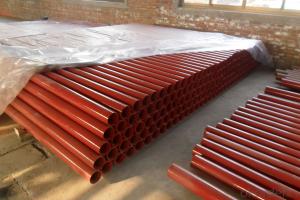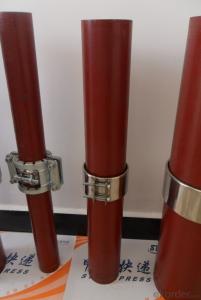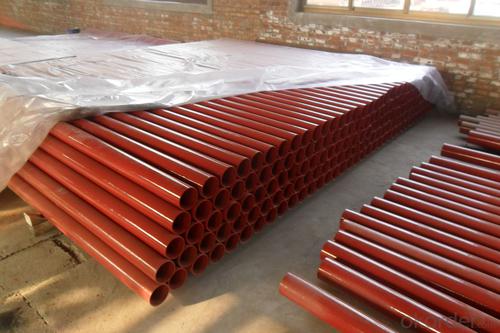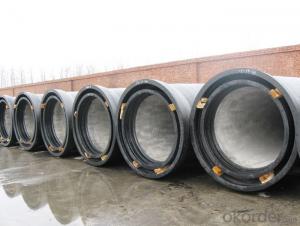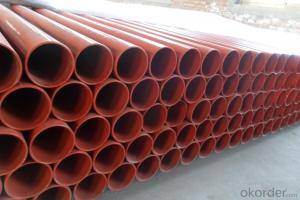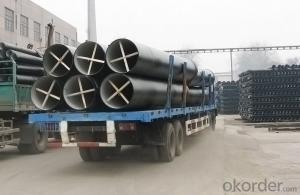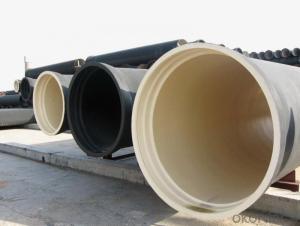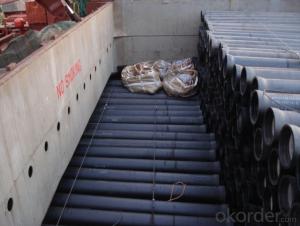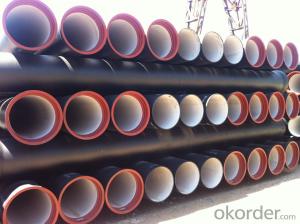Ductile Iron Pipe ISO2531 / EN545 / EN598 K9
- Loading Port:
- China main port
- Payment Terms:
- TT OR LC
- Min Order Qty:
- 200
- Supply Capability:
- 10000 /month
OKorder Service Pledge
OKorder Financial Service
You Might Also Like
1,Ductile Iron Pipe Description :
1) Pipes confirm to ISO2531,K9 class,T type joint,6m long,with inside cements lining conform to ISO4179, outside Zinc spraying(130g/m2) and bitumen coating(70μm) conform to ISO8179.
2) Pipe ends: Spigot and socket ends, with 100% SBR rubber gaskets
accoding to ISO4633
3) we can do third party inspection according to customer's request.
4) Our products have been sold to many international market,
such as Middle East and South East Asia and Africa.
2,Main Features of the Ductile Iron Pipe:
·High yield strength
·High tensile Strength
·High corrosion resistance
·Pressure Resistence
·Anti-corrosion
·Installation is convenient
·Satisfy the highest hygienic standards
3,Ductile Iron Pipe Images:
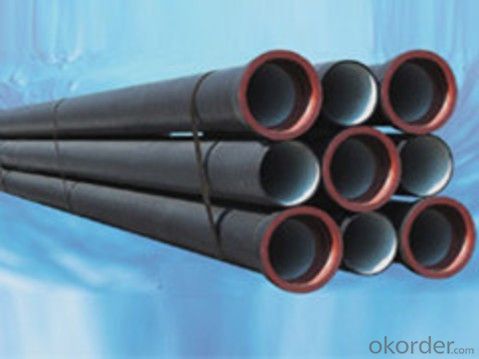
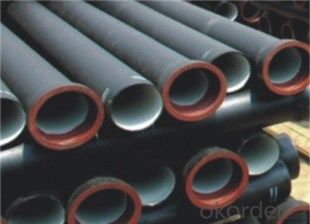
4.FAQ:
We have organized several common questions for our clients,may help you sincerely:
Q: Why would you choose ductile iron pipe rather than other pipe materials?
A:The reasons are obvious for that not only ductile iron pipe possesses the inherent strength and flexibility of ductile iron, combined with proven corrosion protection systems, but also the cost savings can be achieved from design to installation and commissioning.
Q:Why can you guarantee the inner of pipes can’t be corroded?
A: High alumina cement mortar lining and sulphate-resistant cement mortar lining. These two special linings are applicable to inner anti-corrosion for sewage pipes, improving resistance to erosion of the sewage components.
- Q: Are ductile iron pipes suitable for use in irrigation gate systems?
- Yes, ductile iron pipes are suitable for use in irrigation gate systems. Ductile iron is a type of cast iron that has enhanced strength and flexibility, making it a durable and reliable choice for applications such as irrigation gate systems. Ductile iron pipes are known for their high tensile strength and resistance to corrosion, which is important for maintaining the integrity of the irrigation system. Additionally, ductile iron pipes have the ability to withstand high pressure and provide a long service life, making them a cost-effective solution for irrigation gate systems. Overall, ductile iron pipes are well-suited for use in irrigation gate systems due to their strength, durability, and resistance to corrosion.
- Q: Can ductile iron pipe be used for horizontal directional drilling?
- Yes, ductile iron pipe can be used for horizontal directional drilling (HDD). It is a commonly used material due to its durability and strength, making it suitable for HDD applications where trenchless installation is required.
- Q: What are the typical lengths of ductile iron pipes?
- The typical lengths of ductile iron pipes range from 18 feet to 20 feet, although shorter lengths such as 10 feet or longer lengths such as 40 feet can also be found depending on specific project requirements.
- Q: Comparison of ductile iron pipe and spiral steel pipe
- Can only be used for drainage pipe for comparison, other uses are not mentioned in the same breath.
- Q: Are ductile iron pipes suitable for sewer force mains?
- Sewer force mains can indeed make use of ductile iron pipes. Ductile iron, a variant of cast iron, possesses a higher degree of strength and flexibility in comparison to conventional cast iron pipes. This quality renders it suitable for applications where pipes must endure high pressure and heavy loads, such as sewer force mains. Ductile iron pipes exhibit exceptional resistance against corrosion and boast impressive durability, which proves vital for sewer systems that face exposure to various corrosive substances and challenging environments. Moreover, these pipes possess the ability to absorb vibrations and shocks, thereby reducing the risk of pipe failures caused by external forces. Furthermore, ductile iron pipes possess a renowned reputation for their lengthy service life, frequently extending beyond 100 years. As a result, they constitute a cost-effective choice for sewer force mains, necessitating minimal maintenance and replacement throughout their lifespan. In conclusion, ductile iron pipes offer a dependable and long-lasting solution for sewer force mains, delivering the requisite strength, flexibility, and resistance to corrosion to ensure the efficiency and durability of sewer systems.
- Q: What is the difference between a cast iron pipe and a ductile iron pipe?
- Nodular cast iron has high strength and strong plasticity. The tensile strength of ductile iron is twice that of gray iron, and the yield strength even exceeds that of cast steel.
- Q: What is the average weight of ductile iron pipe?
- The size and thickness of ductile iron pipe can cause fluctuations in its average weight. Typically, smaller diameters of ductile iron pipe weigh around 3.5 pounds per foot, while larger diameters can exceed 20 pounds per foot. It is essential to acknowledge that these weights are rough estimates and might slightly differ depending on the manufacturer and pipe specifications.
- Q: Ductile iron pipe, socket connection, pipe length, you can cut open it?
- The cutting length is 4 meters from the jack. Among them, DN300 below 100% can be cut, DN350 above shear ratio is 10%, cut the small head to do chamfering treatment.
- Q: Are there any specific standards or regulations for ductile iron pipe?
- Ductile iron pipe is subject to specific standards and regulations. It is widely used in water and wastewater systems due to its strength and durability. The American Water Works Association (AWWA) C151 standard is the most well-known standard for ductile iron pipe. This standard outlines the minimum requirements for ductile iron pipe, including materials, dimensions, tolerances, and testing methods. It also provides guidance on the manufacturing, installation, and maintenance of ductile iron pipe systems. Apart from the AWWA C151 standard, there are other standards and regulations that govern the use of ductile iron pipe in different countries. In Europe, for instance, ductile iron pipe is regulated by the EN 545 and EN 598 standards. These standards specify the requirements for ductile iron pipes and fittings used in water supply and wastewater systems. Additionally, government agencies like the Environmental Protection Agency (EPA) in the United States may have specific regulations and guidelines for using ductile iron pipe in certain applications, such as drinking water systems. Manufacturers, contractors, and engineers involved in the design, installation, and maintenance of ductile iron pipe systems must ensure compliance with these standards and regulations. This is crucial to guarantee that ductile iron pipe is manufactured to the highest quality standards and that it is installed and maintained correctly, ensuring its durability and reliability in water and wastewater systems.
- Q: How do ductile iron pipes compare to PVC pipes?
- Plumbing and water distribution systems commonly utilize ductile iron pipes and PVC pipes. When comparing these materials, various factors should be taken into account. Strength and Durability: Ductile iron pipes are renowned for their exceptional strength and durability. They can withstand high pressure and heavy loads, making them suitable for underground and high-traffic areas. Conversely, PVC pipes are less sturdy and more prone to cracking under extreme conditions. However, PVC pipes have the advantage of being corrosion-resistant and do not rust, which is beneficial in certain environments. Installation and Maintenance: Ductile iron pipes are heavier and require specialized equipment and skilled labor for proper installation. In contrast, PVC pipes are lightweight and easy to handle, making installation simpler and quicker. Additionally, PVC pipes require less maintenance as they do not corrode or develop mineral deposits over time, unlike ductile iron pipes which may need regular cleaning and maintenance to prevent rust and sediment buildup. Cost: PVC pipes generally have a lower cost compared to ductile iron pipes. The lower material and installation expenses associated with PVC pipes make them a popular choice for budget-friendly residential and commercial plumbing projects. Ductile iron pipes, while offering superior strength and durability, tend to be more expensive due to the higher cost of materials, specialized installation requirements, and additional maintenance expenses. Environmental Impact: PVC pipes are made from non-renewable resources and can have a negative environmental impact during production and disposal. On the other hand, ductile iron pipes are made from recycled iron and have a longer lifespan, reducing the need for replacement and minimizing waste. However, it is important to note that PVC pipes can be recycled, and many manufacturers have implemented sustainable practices to minimize their environmental footprint. In conclusion, ductile iron pipes and PVC pipes possess distinct characteristics that make them suitable for different applications. Ductile iron pipes excel in strength and durability, making them ideal for heavy-duty applications, while PVC pipes offer cost-effectiveness, easy installation, and corrosion resistance. Ultimately, the choice between the two materials depends on the specific requirements, budget, and environmental considerations of the project.
Send your message to us
Ductile Iron Pipe ISO2531 / EN545 / EN598 K9
- Loading Port:
- China main port
- Payment Terms:
- TT OR LC
- Min Order Qty:
- 200
- Supply Capability:
- 10000 /month
OKorder Service Pledge
OKorder Financial Service
Similar products
Hot products
Hot Searches
Related keywords
